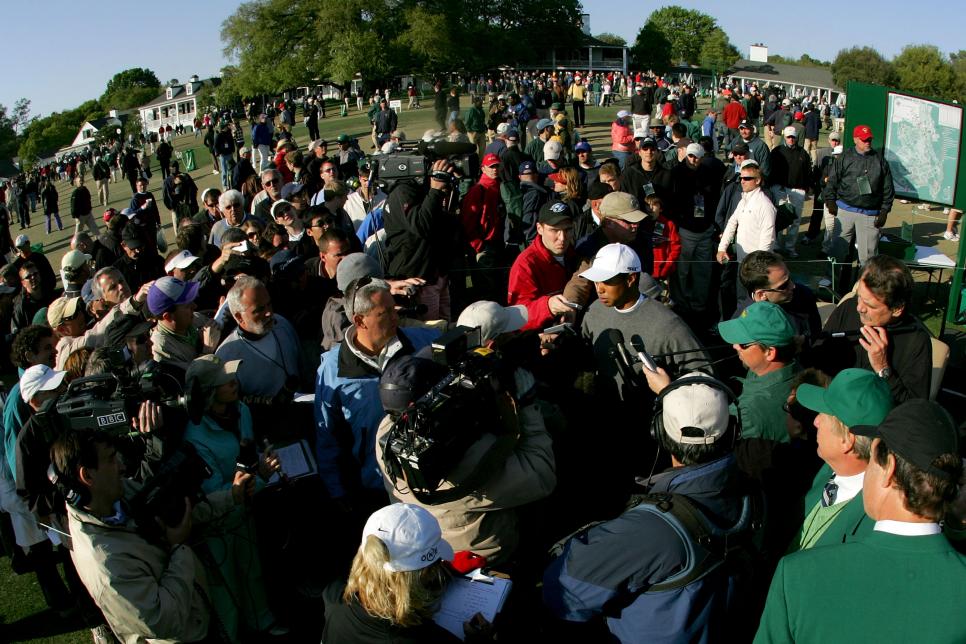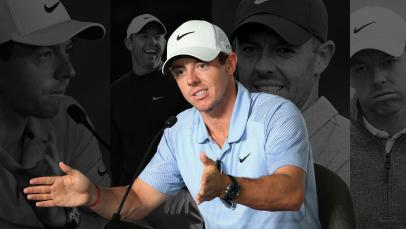No Further Questions
Rory McIlroy's media blowoff reignites a debate about obligation in the face of frustration

Moments after he missed a short putt on the 18th hole and lost the U.S. Open to Bryson DeChambeau, Rory McIlroy marched out of the champions locker room at Pinehurst and hurried down a corridor trailed by a crowd at least 20 strong. Some were members of his team, some were USGA officials and two were part of a Netflix film crew, but a few of us were journalists, and we kept a wary distance out of an unspoken respect (or awe?) for the pain he'd just experienced. He exited into the players' parking lot, stowed his clubs in the courtesy car and drove away. The journalists gathered there just watched him. We hoped it would be different, but this was not unexpected considering the circumstances: He'd blown us off.
The post-round, post-match, post-game media blowoff seems to have become increasingly common, particularly in golf where there is no system of fines governing media appearances. Players are approached after a round by a go-between tournament media official who typically uses an apologetic "I hate to ask this" tone, and they appear at their own discretion, perhaps compelled by long standing decorum but always free to decline. In other words, the post-round presser is a norm, but not a rule.
Even today, most don't decline—in an individual sport like golf, press is usually a good thing—but it's also the case that the more money and prestige a player accumulates, the less accessible he becomes to the media. Even within that context, though, it was an unwritten rule that post-round interviews were immune to the blowoff, at least when a player had done something significant on the course (with 150 players in a field, you quickly enter a gray area in terms of who must be available without a compelling reason, and it's often up to an individual reporter to track down a player who doesn't figure prominently in the tournament action). Tiger Woods, for instance, almost never missed a media appearance in his prime, regardless of how he played.
In other sports, media appearances are legislated by fines. This is true in the NFL, where players are required to speak to the media after games for 10-15 minutes. Marshawn Lynch famously flouted that rule because he would leave immediately after his shower to see his family. That resulted in the accumulation of a whopping $1.2 million in fines and culminated in 2015 in the infamous Super Bowl XLIX media appearance, where he answered every question from the gathered reporters with the same eight words: "I'm just here so I won't get fined."

The NBA is slightly less stringent, given the 82-game schedules, but only slightly; a warning is given on a first offense, and a second offense yields a fine. Jimmy Butler and Dillon Brooks are the most recent recipients of that fine, having been docked $25,000 each in the 2022-23 season for violating rules on media availability. (In 2003, Rasheed Wallace had his own Marshawn Lynch moment, when he responded to every question in a playoff presser with the phrase "both teams played hard." In his case, it wasn't a complaint about having to appear in front of the media, but the fines he'd accumulated for what he said. His tactic didn't work; David Stern, unamused by his routine, fined him $10,000.) As a team, the Knicks were fined $25,000 for not making Julius Randle available in 2022. Even the WNBA isn't immune; Sabrina Ionescu was among three players fined $2,000 each for failing to appear after a Finals game.
Major League Baseball, with its 162-game schedule, is a different beast; there are no contractual obligations for players to speak with the press and no fine system in place. Locker rooms are open before and after games, but certain big-name players are notorious for hiding from the press in off-limits areas of the clubhouse. (Hall of Famer Eddie Murray is an example of a player who took advantage of this; he became angry enough at a column that referenced his family early in his career that he spoke to the press only rarely, and even when the Baltimore Orioles retired his number in 1989, he gave the press a "no comment.") The NHL is similar, with the added complication that teams in developing markets or where there’s intense competition with other sports tend to be more media-friendly, while more established, popular hockey teams have become selective.
Perhaps the best comparison to golf, though, is tennis, another individual sport where there is no team structure in place and the players are independent contractors. Considering the similarities, there is a surprising difference between the two sports.
"It’s against the rules to skip a post-match press conference if requested, but fines were not reliably applied by the Slams or WTA," said Ben Rothenberg, longtime tennis writer and author of the book Naomi Osaka: Her Journey to Finding Her Power and Her Voice. "It became a huge flash point when Osaka did it at the 2021 French Open, of course, but I think that was just because of the confrontational way she announced her intention to break the rules days in advance, so it sort of escalated to a first-degree, aggravated, premeditated version of this misdemeanor."
'What we've seen in the last several years is players feeling they can talk to fans directly through social media. Why do we need to talk to the press? I can tell them myself. But why would you want to hear it from a player who's not going to be honest with you, and without being questioned?'—Doug Ferguson, Associated Press golf writer
Rothenberg pointed out that Osaka introduced the idea of skipping media for mental-health reasons, which has been used since by several players, including a dubious incidence when Belarusian star Aryna Sabalenka invoked mental health in what looked from the outside like a way to avoid questions about Russia's invasion of the Ukraine. To Rothenberg, though, there's a bigger structural issue at play.
"I think the bigger factor in why press gets skipped more is that players, agents, and tour officials don’t see independent tennis media as being as crucial to their players on a business level anymore," he said. "They’d rather use their own social media or give in-depth access to mainstream publications like Vogue, Vanity Fair, etc."
Doug Ferguson has been covering golf for the Associated Press for 30 years, and he has a similar perspective about the rising influence of agents and social media.
"It's probably happening more," he said. "I think the agents, if you put yourself in their shoes, they're probably trying to look out for their players and protect them. But I think they can sometimes make it worse just by creating a persona that this guy's not stand-up because he won't stop and take questions."
"But the other thing too," he added, "is how much the tour has coddled these players. They've given them so much, and they've made them feel so entitled and pampered and protected."

Tiger Woods almost never missed a media appearance in his prime, regardless of how he played.
Andrew Redington
Ferguson had plenty of memories of players facing the media music after particularly painful moments; Ed Sneed losing a heartbreaking '79 Masters and actually sitting in Butler Cabin for a TV interview; Tom Watson telling reporters, "Hey, this ain't a funeral" after his 2009 heartbreak at Carnoustie; even Rory himself giving good, thoughtful answers when he shot an 80 to give up a four-shot lead at Augusta. And then there's Tiger, the biggest star in the game's history, who Ferguson couldn't remember ever skipping media at a major.
"What we've seen in the last several years is players feeling they can talk to fans directly through social media," he said. "Why do we need to talk to the press? I can tell them myself. But why would you want to hear it from a player who's not going to be honest with you, and without being questioned?"
Ferguson and I have had a similar experience of late, which is that McIlroy, who has long been one of the most fascinating quotes in professional golf, has become the biggest offender of the blowoff. Most of the time, as when he decided to skip early post-round media at the Wells Fargo in 2023, the snub is so minor that nobody comments on it. Other times, as when he was holding a one-shot lead at the 2022 PGA Championship, Ferguson remembers the print media getting just three questions on that Thursday—which he called "insulting"—followed by McIlroy skipping press entirely on Sunday. There was also a bizarre situation at last year's Scottish Open, when his agent informed the press that he wouldn't be speaking, but he showed up near the 18th green around a scrum of reporters who "just kind of stood around looking at their shoes."
Ferguson has sympathy for McIlroy, though, both in his moments of intense pain and in ordinary post-round moments, when the obligations can stack up to a point of absurdity.
"We don't see half the crap that they have to do," he said, "I'll never forget Henrik Stenson shooting a great round at Bay Hill, close to the lead, and when he came out of the tent, the first thing he heard was, ‘you’ve got six stops.’ They've got Sky and the Tour and Golf Channel and Golf Central … put yourself in a player's shoes. That good mood is all of a sudden gone."
Still, Ferguson is not in favor of a system of fines to enforce media availability.
"I'd hate to see it come to that," he said. "This sport for so many years has had so many educated, socially adept, mature people, that I'd rather they just learn to be professionals."
Ferguson acknowledged that it's possible to write a good or even great story on a golf tournament without a key player's quotes. The blowoff doesn't kill journalism, even if it makes it harder. And certain players are so well-trained at giving bland answers that their quotes add very little to the story. But a total absence of quotes still harm the story, which has knock-on effects for how interested the public will be in following these players. Ultimately, that’s the name of the game for everyone involved—to stimulate interest in the sport. It’s an easy message to forget, but an athlete’s livelihood depends on that interest, and part of that arrangement is sharing their thoughts in the aftermath of high-stakes competition. To forget that is to forget the big point—the thing that got them here, and the thing that will keep them here.




